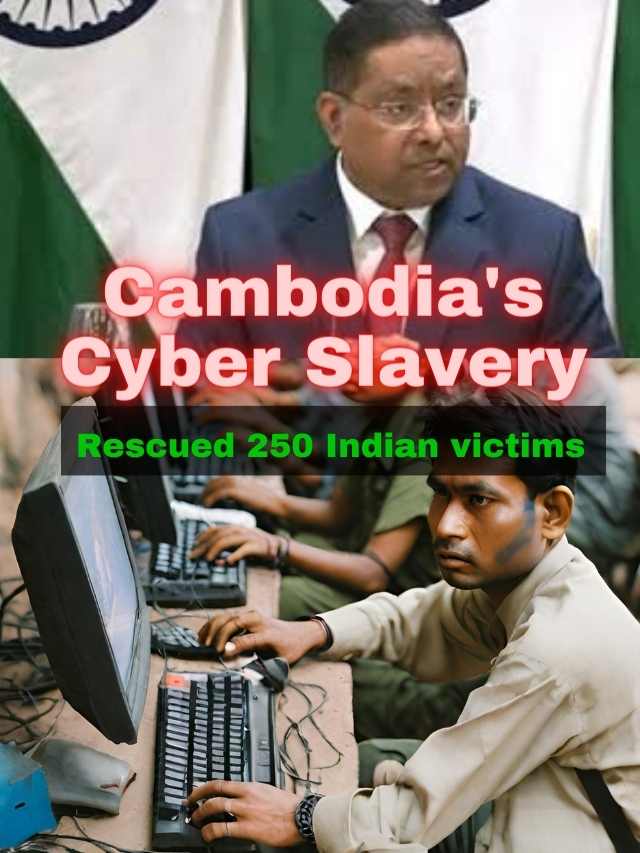
From Data Entry to Cyber Slavery: India Exposes Cambodia’s Dark Secret
In a shocking revelation, thousands of Indian citizens found themselves trapped in a nightmarish web of cyber slavery, orchestrated by a transnational organized crime syndicate operating from Cambodia. These unsuspecting individuals were lured with false promises of lucrative data entry jobs, only to be coerced into carrying out cyber frauds and other illegal online activities upon their arrival in the Southeast Asian country.
The sinister scheme unfolded as agents targeted vulnerable individuals, predominantly from the southern regions of India, exploiting their economic vulnerabilities with the bait of employment opportunities. However, the reality that awaited them was a living hell, where their passports were confiscated, and they were forced to work gruelling hours, engaging in cyber scams that targeted their fellow countrymen back in India.

Trapped in Cambodia: India’s Battle to Free Cyber Slaves
Trapped in a web of deceit, these victims endured inhumane treatment, facing physical and psychological abuse if they failed to meet their daily targets. Their harrowing accounts paint a grim picture of exploitation, with some forced to pose as women on dating apps to lure unsuspecting victims into cryptocurrency investment scams or extort money by impersonating law enforcement officials.
As the shocking details of this cyber slavery ring emerged, the Indian government swiftly mobilized resources, collaborating closely with Cambodian authorities to orchestrate a daring rescue mission. The Joint efforts of law enforcement agencies and diplomatic channels have already led to the repatriation of over 250 Indian nationals, while ongoing investigations aim to dismantle the criminal network and bring the perpetrators to justice

Shocking Revelation: Thousands of Indians Trapped in Cambodia’s Cyber Slavery Ring
When the shocking news broke that over 5,000 Indian citizens were being held captive in Cambodia and forced to carry out cyber frauds against their countrymen, it sent shockwaves across the nation. According to the Indian government, these fraudsters have managed to dupe unsuspecting individuals in India of a staggering amount of money, estimated to be around 500 crore rupees (approximately $61 million) in just the last six months alone.
Recognizing the gravity of the situation, the Ministry of Home Affairs (MHA) promptly took action, calling for an urgent high-level meeting with representatives from various ministries and agencies. This included officials from the Ministry of External Affairs (MEA), the Ministry of Electronics and Information Technology (Meity), the Indian Cyber Crime Coordination Centre (I4C), and other cyber security experts.
The primary objective of this crucial meeting was to discuss and understand the intricate workings of this organized criminal network that had ensnared thousands of Indian citizens. The ultimate goal was to devise an effective strategy to rescue these trapped individuals from the clutches of their captors in Cambodia.
The Sinister Modus Operandi: Luring Victims with False Promises
Investigations by central agencies have revealed a disturbing pattern: agents are trapping individuals, mostly from the southern part of the country, with the promise of lucrative data entry jobs. However, upon arrival in Cambodia, these unsuspecting victims find themselves coerced into carrying out cyber fraud, their passports confiscated, and their freedom stripped away.

The Rourkela Police in Odisha busted a cyber-crime syndicate on December 30th last year, arresting eight individuals allegedly involved in trafficking people to Cambodia. The case came to light after a senior central government officer filed a complaint, having been duped of around ₹70 lakh (approximately $85,000).
Harrowing Accounts from Rescued Victims
Firsthand accounts from rescued victims paint a grim picture of the ordeal they endured. Stephen, one of the rescued individuals, shared his harrowing experience:
“An agent in Mangaluru offered me a data entry job in Cambodia. At the immigration, the agent mentioned that we were going on a tourist visa, which raised my suspicion. In Cambodia, we were taken to an office space, where they held an interview, and the two of us cleared it. It’s only later that we got to know that our job involved looking for profiles on Facebook and identifying people who can be scammed.”
Stephen further revealed the gruelling conditions they faced, including creating fake social media accounts, meeting daily targets, and facing the threat of punishment for non-compliance. “We had targets, and if we didn’t meet those, they would not give us food or allow us into our rooms. Finally, after a month and a half, I contacted my family, and they took the help of some local politicians to speak to the embassy.”
Unravelling the Web of Deceit: Dating Apps and Investment Scams
The scam primarily targeted victims through dating apps, where recruits posed as women to lure targets into cryptocurrency investment scams. Victims were persuaded to invest in fake stocks and use a fraudulent online app, resulting in significant financial losses.
Rourkela Sub Divisional Police Officer Upasana Padhi shed light on the intricate workings of the scam, stating, “This company lured people to invest in fake stocks. They also created a fake online app.”

Collaborative Efforts to Combat Transnational Organized Crime
In a commendable effort, the Indian government, through the Ministry of External Affairs, has been collaborating closely with Cambodian authorities to rescue its trapped citizens. As of now, around 250 Indians have been rescued and repatriated, with 75 being rescued in the last three months alone.
Shri Randhir Jaiswal, the MEA spokesperson, stated, “We remain committed to helping all those Indian nationals in Cambodia who seek our support. We are also working with Cambodian authorities and with agencies in India to crack down on those responsible for these fraudulent schemes.”
The Indian Embassy in Cambodia has been actively responding to complaints from nationals and guiding trapped Indians on how to travel to the embassy for assistance. However, Avaran Abraham, Second Secretary (Consular and Diaspora), highlighted the need for victims to file FIRs with the police, as this would enable Indian law enforcement agencies to take action against the agents and companies involved.

Global Efforts to Combat Cyber Slavery and Online Scams
The issue of cyber slavery and online scams is not limited to India and Cambodia. According to the United Nations, hundreds of thousands of people from around the world have been trafficked to Southeast Asia to engage in online scams, ranging from illegal gambling to crypto fraud. The UN has reported that at least 120,000 people in Myanmar and another 100,000 in Cambodia have been tricked into participating in these scams, enduring inhumane treatment, torture, arbitrary detention, and forced labour.
In March, hundreds of people were rescued from a compound in the Philippines where they were forced to carry out romance scams, masquerading as an online gambling firm. The United States Trafficking in Persons report estimates that more than 10,000 individuals remain held in “scam factories” in Cambodia alone.
The Way Forward: Combating Cyber Slavery and Protecting Victims
As investigations continue and perpetrators are brought to justice, it is imperative to prioritize the protection and well-being of those affected by these egregious crimes. Efforts to address the root causes of such exploitation, including enhancing awareness, strengthening regulatory frameworks, and providing support to victims, are crucial to prevent similar incidents in the future.
Governments, law enforcement agencies, and international organizations must collaborate closely to dismantle these transnational criminal networks and hold perpetrators accountable. Simultaneously, support systems must be established to assist victims in their reintegration into society and to provide them with the necessary resources for recovery.

Frequently Asked Questions (FAQs)
Q. What is the extent of the cyber slavery issue in Cambodia involving Indian nationals?
A. According to reports, over 5,000 Indian nationals have been allegedly held against their will in Cambodia, where they were forced to carry out cyber fraud targeting individuals back in India. The Indian government estimates that these fraudsters have duped people of at least ₹500 crore (approximately $61 million) over the past six months.
Q. How were the victims lured into the cyber slavery scheme?
A. Agents were trapping individuals, mostly from the southern part of India, with the promise of lucrative data entry jobs. However, upon arrival in Cambodia, these victims found themselves coerced into carrying out cyber frauds, their passports confiscated, and their freedom stripped away.
Q. What types of cyber frauds were the victims forced to commit?
A. The scam primarily targeted victims through dating apps, where recruits posed as women to lure targets into cryptocurrency investment scams. Victims were persuaded to invest in fake stocks and use a fraudulent online app, resulting in significant financial losses. Some victims were also forced to extort money from individuals back in India by posing as law enforcement officials.
Q. How have Indian authorities responded to the cyber slavery issue?
A. The Indian government has taken swift action, holding high-level meetings with various ministries and security agencies to devise a strategy to rescue the trapped Indians. The Ministry of External Affairs has been collaborating closely with Cambodian authorities and has rescued and repatriated around 250 Indians so far.
Q. What challenges do the rescued victims face upon returning to India?
A. According to Avaran Abraham, Second Secretary (Consular and Diaspora) at the Indian Embassy in Cambodia, one of the significant challenges is that many rescued victims do not file FIRs (First Information Reports) with the police upon their return. Filing FIRs is crucial for enabling Indian law enforcement agencies to take action against the agents and companies involved in the cyber slavery scheme.
Q. Is the issue of cyber slavery and online scams limited to India and Cambodia?
A. No, the issue of cyber slavery and online scams is a global problem. According to the United Nations, hundreds of thousands of people from around the world have been trafficked to Southeast Asia to engage in online scams, ranging from illegal gambling to crypto fraud. The UN has reported cases in countries like Myanmar and the Philippines as well.
Q. What measures can be taken to combat cyber slavery and protect victims?
A. Combating cyber slavery and protecting victims requires a multi-pronged approach, including enhancing awareness, strengthening regulatory frameworks, providing support to victims, and fostering international collaboration among governments, law enforcement agencies, and organizations. Addressing the root causes of exploitation and ensuring the prosecution of perpetrators is also crucial.
Watch the web story on this topic :
Conclusion
As the world grapples with the growing menace of cyber slavery and online scams, the harrowing ordeal endured by thousands of Indian citizens in Cambodia serves as a wake-up call. This transnational crime syndicate’s exploitation of vulnerable individuals highlights the urgent need for concerted global action against such organized criminal networks. While the collaborative efforts between Indian and Cambodian authorities have led to the rescue and repatriation of over 250 victims, the battle is far from over.
Dismantling these cyber fraud operations and bringing perpetrators to justice must remain a top priority. Simultaneously, robust measures are crucial to protect victims, raise awareness, and address the root causes that enable human trafficking and cyber exploitation. Only through a multifaceted approach, involving law enforcement, policymakers, and international cooperation, can we dismantle the insidious web of cyber slavery and safeguard human rights in the digital age.
Also Read :
Why ‘How Prime Ministers Decide’ Book Matters ? Arvind Kejriwal’s Jail Stint Sparks Curiosity
TATA IPL 2024 Schedule (Full) : Final in Chennai on May 26, All Details Inside Which BCCI Announced
The Alarming Rise of Neurological Disorders: A Global Health Crisis
Google’s Urgent Warning: Is Your Google Drive Data Really Safe?
Meet Devin, The AI Software Engineer Shaping the Future of Coding
Deepfakes: The New Face of Online Misinformation and How to Tackle It































